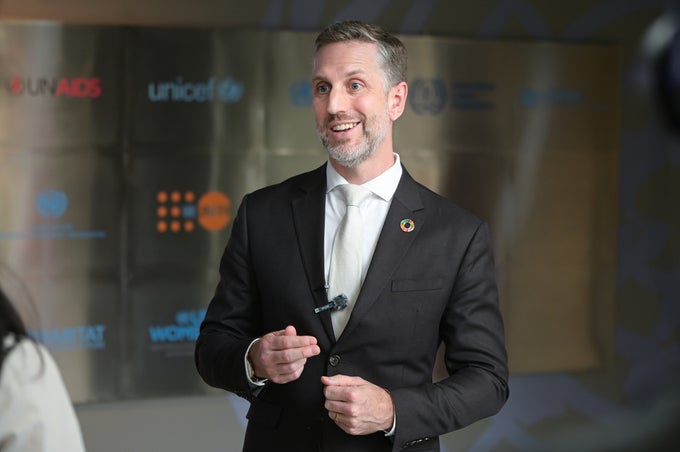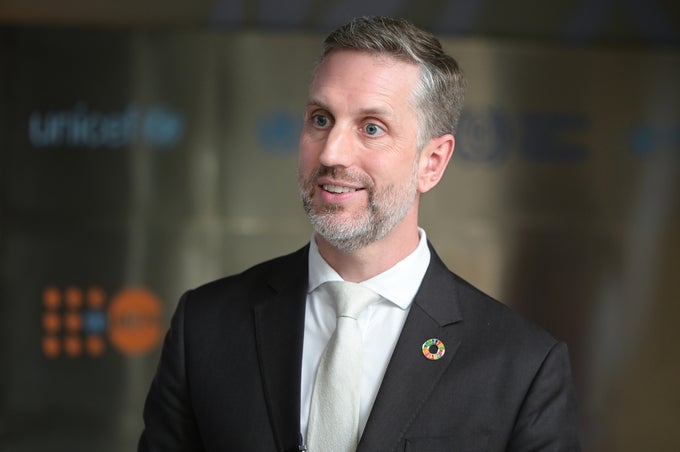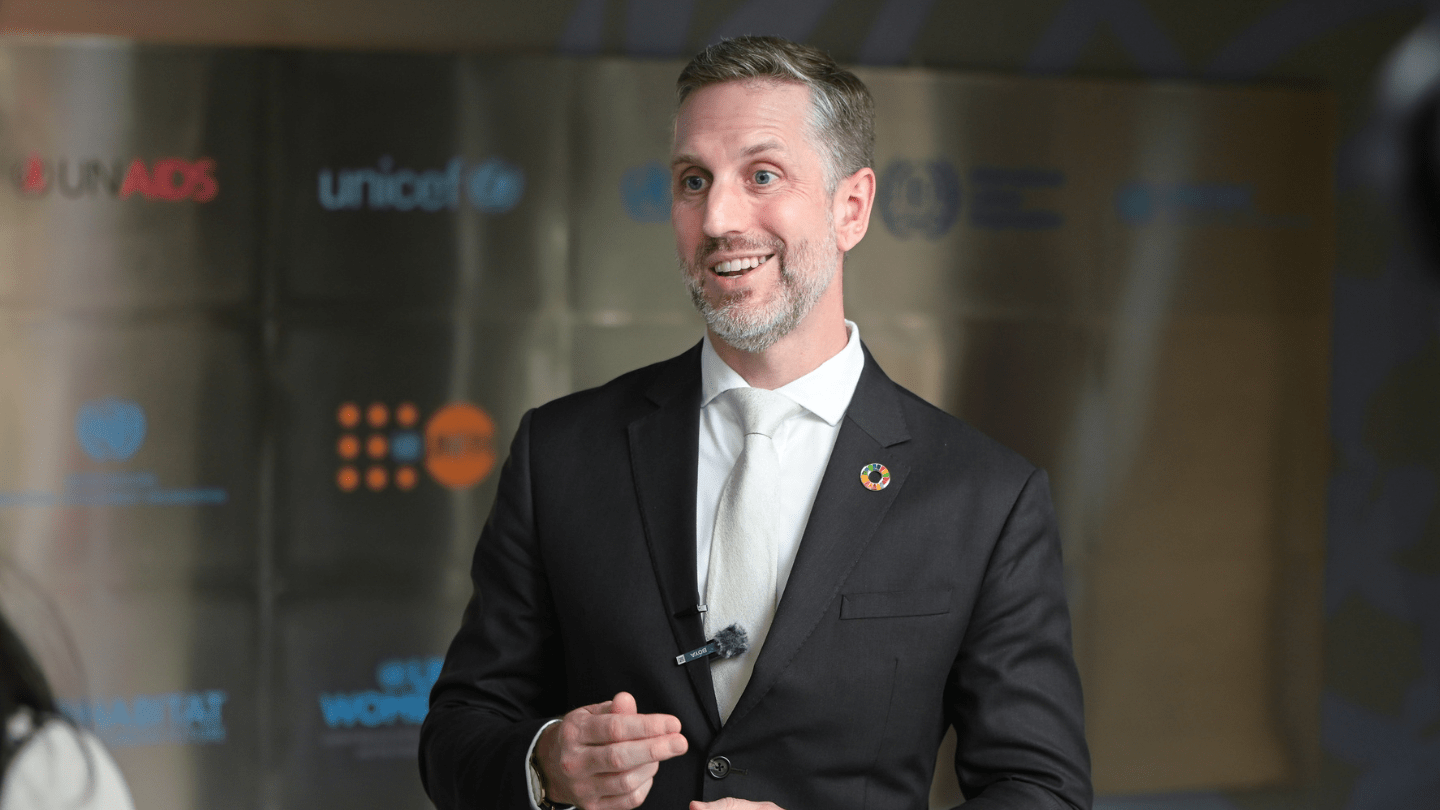On the occasion of International Women's Day (March 8), Vietnam Agriculture Newspaper interviewed Mr. Matt Jackson, UNFPA Representative in Viet Nam, about the organization's past support and future directions to enhance the role, voice, and rights of women in the new era.
Over the years, what programmes and activities has UNFPA implemented to support Vietnamese women? Could you share some memorable stories from your journeys across different provinces in Viet Nam?
I have been fortunate to travel to many regions across Viet Nam and witness firsthand the positive changes that UNFPA has brought through close collaboration with local authorities and communities. UNFPA has been present in Viet Nam for nearly 50 years, since 1977, working alongside the government to address critical issues such as gender-based violence (GBV), domestic violence, reproductive health, and support for young people and older persons.

One of my most memorable experiences was visiting remote mountainous provinces in the north, where ethnic minority communities face significant challenges, particularly in healthcare. Through UNFPA’s programmes, maternal health has significantly improved. Pregnant women now receive regular prenatal check-ups and have better access to district-level healthcare services, ensuring safer childbirth. I have seen community midwives in villages effectively educate women on nutrition, childcare, and maternal health. This initiative, implemented across 60 communities in six provinces, has substantially enhanced maternal and child health outcomes.
Furthermore, UNFPA has been active in preventing and reducing domestic violence. The establishment of One-Stop Service Centers, known as Anh Duong Houses, reflects our holistic approach. These centers provide comprehensive support for women and children affected by domestic violence, including psychological counseling, legal aid, financial assistance, healthcare, and educational support for their children—all in one place. Speaking directly with survivors at these centers has deepened my appreciation for the resilience of Vietnamese women and the immense value of integrated support services.

Photo: Tung Dinh.
What actions are needed to strengthen the role and voice of women, ensuring they live in an environment free from violence and discrimination, particularly in rural areas?
Enhancing the role and voice of women is at the heart of Viet Nam’s development goals. UNFPA works closely with both national and local governments to promote the active participation of women in social and decision-making processes. It is not enough for women’s voices to be heard; they must also be respected and translated into real action.
For example, after Typhoon Yagi, UNFPA swiftly provided cash assistance to pregnant women, helping them rebuild their lives. We are also prioritizing efforts to combat GBV by expanding Anh Duong Houses and strengthening the national GBV hotline to ensure timely and effective support for survivors.
What challenges has UNFPA faced when implementing programmes in rural areas, especially given persistent gender inequalities?
Gender inequality remains a global issue, and in Viet Nam, it is particularly pronounced in rural and mountainous regions where ethnic minority communities reside. Language barriers and cultural differences often make it difficult to convey messages and implement support programmes effectively. To address this, we prioritize culturally and linguistically appropriate interventions so that information and services can be accessed and understood by local communities.

In your view, what should Vietnamese women equip themselves with to maximize their roles and contributions in the new era?
Vietnamese women have made immense contributions to the economy and society, playing crucial roles at both local and national levels. However, as Viet Nam undergoes rapid technological advancements and demographic shifts, women must proactively equip themselves with new skills, particularly in digital literacy and technology.
Mastering digital tools will help women enhance their productivity in the workplace, manage their households efficiently, and engage more actively in their communities. Moreover, lifelong learning is essential to keep pace with the fast-changing job market. Women should actively seek out economic opportunities and ensure their skill sets align with the demands of the digital economy. By investing in digital education and increasing women’s access to technology, Vietnamese women will strengthen their leadership roles and make even greater contributions to the country’s development.
What are UNFPA’s plans and projects for 2025 to support women? What is the organization's long-term vision?
This year, we launched our fifth Anh Duong House in Hoa Binh province, adding to the existing centers in Quang Ninh, Da Nang, Thanh Hoa, and Ho Chi Minh City. In 2025, UNFPA plans to expand this network by establishing at least two new centers in An Giang and Dien Bien. We have already begun preparations, and by early 2026, we hope to open two more centers, further strengthening the nationwide support system for women.
In addition to expanding Anh Duong Houses, UNFPA is committed to supporting ethnic minority communities and addressing their unique challenges. One of our key focuses for the coming years is comprehensive sexuality education for young people, especially adolescent girls. This programme will equip young people with essential knowledge on reproductive health, gender equality, and life skills, empowering them to make informed choices and take control of their futures.
Our long-term vision aligns with Viet Nam’s goals for sustainable economic growth, inclusive social development, and gender equality. UNFPA remains committed to working hand-in-hand with the government and communities to build a future where every woman and girl is empowered, free from violence, and able to realize her full potential.


